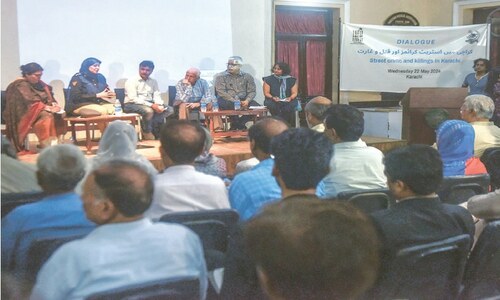HYDERABAD: An assistant professor of the Liaquat University of Medical and Health Sciences (LUMHS) has said that cultural barriers prevent families to get treatment for their children having club foot as they attach different myths to this problem.
Surgeon Fahim Memon was speaking at a workshop organised on Wednesday by the LUMHS ahead of its international symposium on ‘Ponseti Technique” to treat club foot. LUMHS vice chancellor Dr Noshad Shaikh was chief guest.
Experts giving presentations included Jinnah Postgraduate Medical Center (JPMC) Executive Director and focal person for the Ponseti International Association Prof Aneesuddin Bhatti, Prof Ameen Chinoy, Dr Zameer Soomro, Dr Mehtab Pirwani and Dr Irshad Bhutto.
Surgeon Memon — who is among 40 doctors trained for Ponseti technique under USAID assistance in the country — said that out of 1,000 children, three to four face this developmental problem of club foot and of these children one third were born with bilateral club foot.
He said it was an easy and non-surgical treatment. Information dissemination regarding it was need of the hour as most of the patients were unaware of this low-cost and effective treatment for deformity. Due to lengthy treatment, it was essential for Ponseti experts to counsel parents to avoid relapses, he added.
He said it could not be detected before 16th week of pregnancy in any case. Its treatment could be started from day one after birth. The longer it was delayed, the lengthier would be its treatment, he said. Primarily, he said, a newborn was to be examined by a pediatrician to check all kind of deformities at the time of birth but since no such practice existed in the government and even in private hospitals except for some very reputable ones, these problems went unnoticed and resultantly ignored by parents.
Here, he said, parents linked this problem to different myths and beliefs. Some even said it was a punishment baby’s father for the sins he committed. Then, he said, such families tried to fix problem through traditional bone setters who applied different orthodox methods but without any result. Many families waited for events like lunar and solar eclipses and buried lower region of their children in sand to heal them.
Dismissing these myths, Dr Fahim said that all these were cultural barriers due to lack of awareness. He said that in fact, problem was treatable with Ponseti technique without going for any major surgery. He said the treatment could start soon after birth of a baby with club foot. It should not be delayed. It was treated with simple plasters for six weeks initially followed by a minor incision in a vein and then another three weeks course of plaster.
Subsequently, he said, baby was given foot abduction braces to be used round the clock for three months and then it was used for 14 to 16 years. Follow-up, he said, was vital for such treatment which continued for three to four years, otherwise chances of relapse were always there. He said Ponseti technique was producing good results.
Dr Aneesuddin Bhatti said 40 doctors were trained for this technique and 22 of the came from Sindh. He said workshops were held for promotion of this technique. He talked about how the child was assisted and evaluated for this treatment.
He said the Ponseti International Association was a global leader in training and educating healthcare providers on treatment for congenital club foot. He said these trained doctors were serving population even in rural areas and number of hands on workshops were arranged for training of postgraduate students. He said material was published in Urdu and Sindhi for awareness about treatment/follow-up of club foot through Ponseti technique so that deformed foot could be treated at early stage with lowest cost.
Prof Noshad Shaikh said that more such workshops would be held in the LUMHS for training of doctors. This method was highly effective if applied properly by a trained healthcare professional.
He said it was considered “gold standard” treatment for club foot. Healthcare providers in the least developed areas could be trained to use it to helping hundreds of thousands of children walk around.
Published in Dawn, March 5th, 2015
On a mobile phone? Get the Dawn Mobile App: Apple Store | Google Play















































Dear visitor, the comments section is undergoing an overhaul and will return soon.